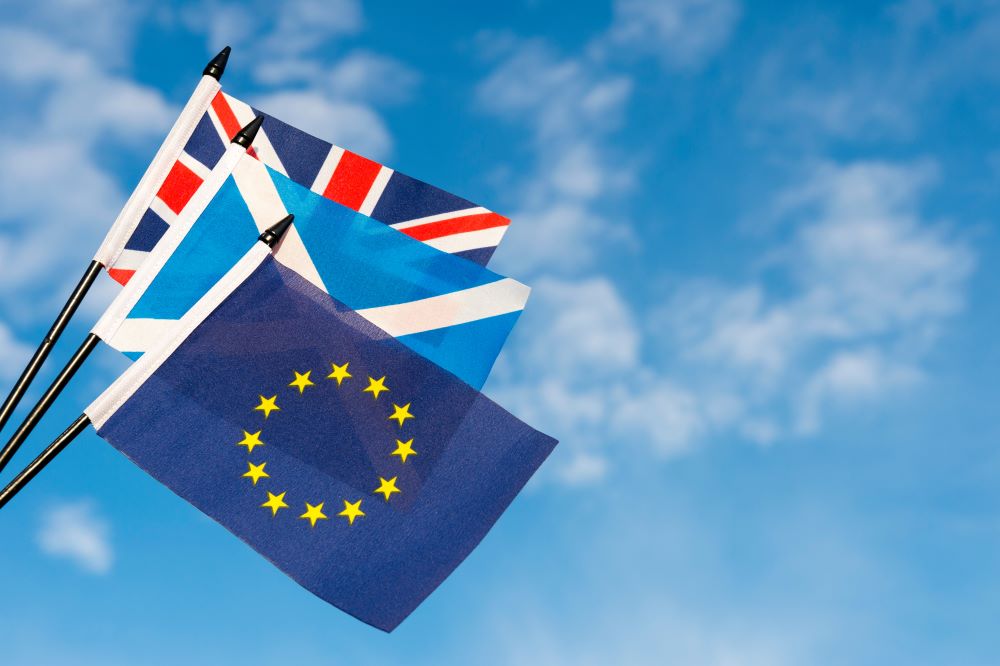
The Scottish government is revisiting its Brexit contingency plans in preparation for a potential trade war between the UK and the EU over the Northern Ireland Protocol.
A spokesperson for the devolved government said ministers were looking to minimise disruption of essential supplies and were “deeply concerned about [UK government] threats to unilaterally override the Northern Ireland Protocol”.
The Herald reports the spokesperson adding: “We will continue to call for a negotiated solution and as a responsible government are preparing contingency plans arrangements – including the consideration of previous no-deal preparations that were in place during the negotiations for the EU-UK Trade and Cooperation Agreement.”
Food exports
In 2019, Scottish exports to the EU accounted for almost half of its total of £16.4bn and the Scottish government is particularly worried about tariffs on British seafood and agricultural products.
Food and beverages accounted for the largest proportion of Scotland’s income from abroad, worth £6.6bn.
Scottish ministers are said to be in regular talks with the nation’s food and drinks industry, and businesses are in discussions with the UK government and the EU, reports the Express.
As previously covered in the IOE&IT’s Daily Update, foreign minister Liz Truss has set out proposed legislation the UK government could use to move to suspend parts of the Protocol.
Protocol plans
The UK is proposing that British goods destined for NI would only have to meet British standards, while those progressing to the Republic of Ireland, which remains in the EU, would go in a separate supply lane and be subject to EU checks.
Maros Sefcovic, the EU’s negotiator, has said that if the UK acted unilaterally, the bloc “will need to respond with all measures at its disposal”.
The EU-UK Trade and Cooperation Agreement and the Withdrawal Agreement could come under threat if the UK ditched parts of the protocol.
Firms concerned
The Guardian reports that firms are concerned that new Brexit roadblocks could hit their export drive while they recover from that pandemic, with inflation rising and supply chains disrupted.
Mark Brearley, director of London-based Kaymet which exports tea trays to 40 countries, said: “The EU really feels like the hardest place in the world to ship things to sometimes.”
Brearley said he worried that Kaymet will suffer if the EU responds with fresh trade barriers. “There’s a sense of, ‘Oh God, here we go again,”’ he added.
Danny Hodgson of Rivet & Hide, which sells men’s clothing said EU sales, which he spent a decade building, plunged by half in the first month after Brexit and never recovered.
Raoul Ruparel, Theresa May’s special adviser on Europe during Brexit negotiations, said companies should dust down no-deal Brexit plans if the situation worsens.
“Any business will tell you it’s unhelpful,” he said. “In this case, a lot of them are just getting on with it and they just have to make the best of it. But what they don’t want is constantly changing trade rules with the UK and the EU.”
Exports depressed
UK exports to the EU remain significantly below pre-Brexit levels, despite some recovery from an initial plunge of 40% in January 2021 at the end of the transition period. They finished last year down 11% compared with 2018.
According to the Netherlands Bureau for Economic Policy Analysis, which tracks global trade, goods exports in March from advanced economies – including the UK, US, Japan and euro area – were 2% above the monthly average for 2018, after adjusting for inflation. In the UK, however, real exports were almost 22% down in the same month.



